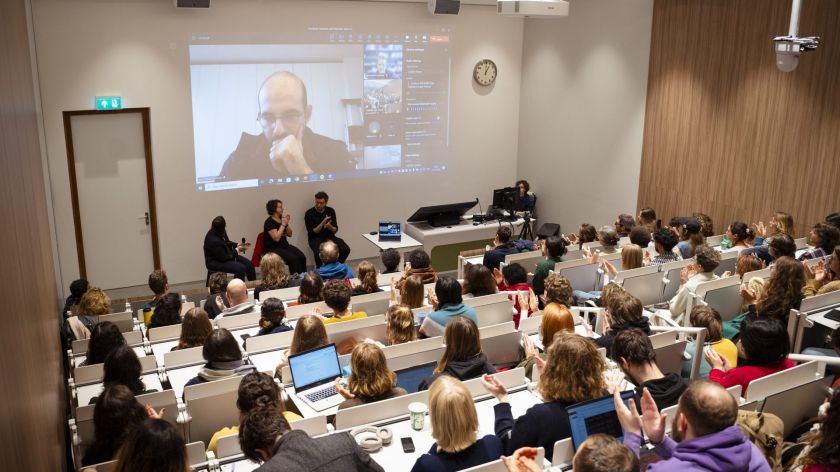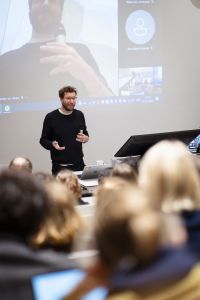Canceled lecture series on Israel-Palestine situation: ‘Censorship’ or ‘guidelines’?
-
 The teach-in. Photo: Johannes Fiebig
The teach-in. Photo: Johannes Fiebig
Nineteen scholars organized a 'teach-in' on Monday to discuss the situation in Israel and Palestine. However, they claim that the university administration imposed such significant restrictions that the scholars equate it to censorship. Eventually, they changed the focus of the lecture series to 'academic freedom.' The university's board, however, asserts that there was never any censorship.
Visibly affected, Harry Pettit, a university lecturer in social geography at Radboud University, opened the ’teach-in’ on Israel and Palestine on Monday afternoon. He did so in a packed lecture hall in the Maria Montessori building; dozens of attendees were seated in the aisles and standing in the hallway. Pettit: ‘I would have liked to discuss the geopolitical and historical backgrounds of the conflict here. But instead, I will now talk about what has happened in the past few days.’
According to the organizers, the university’s Executive Board allegedly intervened to halt the lecture series on the Israel-Palestine conflict that Pettit and fifteen other colleagues (all scientists, mostly in social geography) had planned. The so-called teach-ins, open to anyone interested, were allowed to proceed only with certain reservations.

The reason: complaints from students with an Israeli background. The organization states that they feel unsafe due to the announced lectures.
Watermelon
According to the participating scientists, the first meeting had to be postponed and could only take place if the invitation was strictly limited to students of social geography. They were also disallowed from publicly disclosing its location. Finally, the poster for the lecture had to be modified because it featured a watermelon (a symbol used to express support for Palestine, eds.). The organization claims that this directive came from ’the university.’ The exact source of these restrictions is not clear.
“The university should not have to give us permission to educate people about this conflict.”
In response, the organization changed the subject of the gathering. The topic of discussion was no longer the conflict itself, but academic freedom and censorship at Dutch universities—specifically at Radboud University—regarding the struggle between Israel and Palestine.
‘It’s strange that, in this conflict, we suddenly can’t speak openly anymore without people feeling unsafe,’ Pettit tells the audience. ‘We need to discuss this precisely because it’s uncomfortable. Isn’t it fantastic that people from outside the faculty, or even outside the university, are present? That’s exactly what science is for.’
Permission
Michiel Bot, associate professor at Tilburg Law School and one of the speakers on Monday afternoon, describes the actions of Radboud University as ‘an unprecedented form of censorship.’ Bot states, ‘The university should not have to give us permission to educate people about this conflict. That is part of our academic freedom. We must resist this way of doing things.’
‘We are continuously being thwarted from higher up.’
Anya Topolski, associate professor of Ethics and Political Philosophy, specializing in racism, also criticizes the policy. ‘It is important to understand how racism works and can even lead to genocide so that we can prevent it. We cannot achieve that if we are silenced from above, especially not in the name of social safety. Social safety concerns misconduct, not whether students learn about uncomfortable topics.”
Topolski states in her speech that she is sick of ‘how I, and others brave enough to speak up, are continuously thwarted from higher up. This case is no different. How can it be that a university censors its experts in conflict studies, racism, colonialism, politics, and history during times of conflict?’
‘No hard restrictions’
A university spokesperson disputes the imposition of strict restrictions or an attempt to censor the scientists from higher up. He does however acknowledge that there was an intervention beforehand. ‘The Board of Directors asked the Faculty of Management Sciences to ensure a safe environment for the lecture, without specifying restrictions.’
‘We hope that the teach-ins can still be held within a safe context.’
‘Consequently, a discussion began within the faculty that led to the cancellation of the meetings,’ the spokesperson continues. ‘The organizers did so based on guidelines from the faculty board.’
He expresses regret that the lectures were canceled and that the scientists feel limited in their academic freedom. ‘We hope that the teach-ins can still be held within a safe context.’
The organization is currently in discussion with the faculty board about the setup of the lecture series. While these discussions are ongoing, the organization does not want to respond to questions from Vox.
Translated by Siri Joustra



